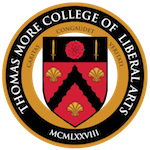ADVENTURES OF TMC PILGRIMS IN THE ETERNAL CITY
This Be Not End: Ciao, Roma.
At this point, we have all left Rome. Personally, I was quite determined not to miss it. I gave myself a stern talking-to about being present to my surroundings, no matter how ordinary they were. I rejoiced that I would not hear sirens every ten minutes, and not take public transport everywhere, and not be accosted by selfie-stick sellers and African bracelet men at every corner. I told myself that it would be lovely to get back to normal life, with normal breakfast, normal coffee, and a normal routine, with a normal wake-up time and normal people who spoke my own language and didn’t gesticulate so alarmingly all the time.
But normalcy isn’t everything.
I arrived in England three days ago. I am volunteering on an absolutely gorgeous egg farm in the middle of nowhere near Wales. Not coincidentally, I am next to the valley that is supposedly the real-life Narnia. I am living in a four-hundred-year-old half-timbered Hall. I drink tea and eat toast every morning at 8am precisely. I listen to English people talk about literature and landscape history and local gossip for twelve hours every day. I adore it. I never dreamed about going to Rome, I dreamed about this place: the home of J.K. Rowling and Jane Austen, James Herriot and J.R.R. Tolkien, C.S. Lewis and G.K. Chesterton. They were my childhood reading and my high-school education. They were my center and my saints.
One would think that missing Rome would be impossible in my present situation. But no matter how determined I am, I see photos of Rome and my heartstrings decide that they’d suddenly like to be divorced from my heart. I remember the Forum, Santa Maria Maggiore, my friend Brunella at San Benedetto, or the religious habits billowing around every corner, and my mouth decides that it’s time to imitate Annie Fagan’s really impressive talent of frowning with her entire face. Cue melancholic hipster music as I stare moodily off into the distance. Let the wallowing begin.
So why do I miss Rome?

Dr. Connell once told me, “You’re coming to the source of something in Rome. That’s what I hope to awaken in all of my students, and I hope that it’ll be something that they can grow on for the rest of their lives… The student should see, and pause, and say, ‘Oh. So this is what it’s about! So this is all the fuss.’” I realized, on the taxi ride to the airport, that Rome sits in the heart a certain way: you don’t really have to hold onto it, it holds onto you. They say that traveling widens the mind; traveling to Rome, particularly, deepens the mind until it finds bedrock. As a Catholic, I know that I just spent three months at the heart of the universe.
It is the utter centrality and life of Bella Roma that I miss. I think it made itself known to each of us in different ways – and we hardly even sounded its depths. Une vita nole basta. I found that center in the hordes of seminarians and religious at the Angelicum, in the hundreds of Masses said every morning and evening, in the priests hurrying through Saint Peter’s at 7am with patens and chalices, flowing like blood through a massive heart. I found it in the bones of the saints in every church, in the pagan temples preserved in the streets and in the basilicas, and in the messy, chaotic, sheer humanity of the city. I found it in the skyline speckled with domes and crosses, in the church bells tolling each hour, in the Stations of the Cross lining the hills and the madonellas protecting the streets. I found it in my classmates as I watched them struggle, pray, grow, love and be loved by their Lover.
When I first saw Rome three months ago, watching the sunset from the Spanish Steps, I thought of the poem “Archaic Torso of Apollo” by Rainer Maria Rilke. The narrator ends, “Here there is no place that does not see you. You must change your life.” Looking at Rome for the first time, I knew it was true, but I wasn’t sure why. Now I understand. Rome is the meeting of Heaven and Earth. She is the heart of the world. She is not yours: you are hers. She sees you and demands that you, too, become a meeting-point of Heaven and Earth – that you eternally dwell in Her. You must change your life.
I used to think the center of my world was England. My patron saint, for all practical purposes, was C.S. Lewis. But just this weekend, in a kerfuffle over how I was going to make it to the nearest Catholic church (which wasn’t near at all), I marveled with a small twinge of resentment at how Lewis refused Rome up to the very end. I can no longer fathom a life without Rome, without the Church, without the bedrock that supports all good things. And as much as I still love Lewis, I find it much harder to sympathize with the “mere” Christianity he proposed: a Christianity without all the mess, chaos, sanctity and humanity of Rome.
The Rome program is foundational to a Thomas More student precisely because it is the discovery, for each individual person, of the rock on which he or she stands. Foundational, here, does not merely mean “something you must learn before you can go on.” It is not sediment, collected over the years. It is the finding of the very core of the world itself, beneath and before all that.
Such is the change we experienced in Roma. We came to the center, and were centered ourselves.
Ciao, friends. God bless.
Love, the Class of 2020.
Post written by Esther Jermann, photo taken by Gracie Mentink.
